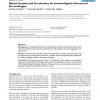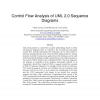477 search results - page 76 / 96 » Collaborative Recommending using Formal Concept Analysis |
99
Voted
ATAL
2011
Springer
13 years 9 months ago
2011
Springer
The field of multiagent decision making is extending its tools from classical game theory by embracing reinforcement learning, statistical analysis, and opponent modeling. For ex...
BMCBI
2007
14 years 9 months ago
2007
Background: An adequate and expressive ontological representation of biological organisms and their parts requires formal reasoning mechanisms for their relations of physical aggr...
74
Voted
ECMDAFA
2005
Springer
15 years 3 months ago
2005
Springer
This article presents a control flow analysis methodology based on UML 2.0 sequence diagrams (SD). In contrast to the conventional code-based control flow analysis techniques, thi...
116
click to vote
AAAI
1996
14 years 10 months ago
1996
We introduce a predictive concept recognition methodology for description logics based on a new closed terminology assumption. During knowledge engineering, our system adopts the ...
85
Voted
ESWS
2006
Springer
15 years 1 months ago
2006
Springer
Functional descriptions are a central pillar of Semantic Web services. Disregarding details on how to invoke and consume the service, they shall provide a black box description for...


